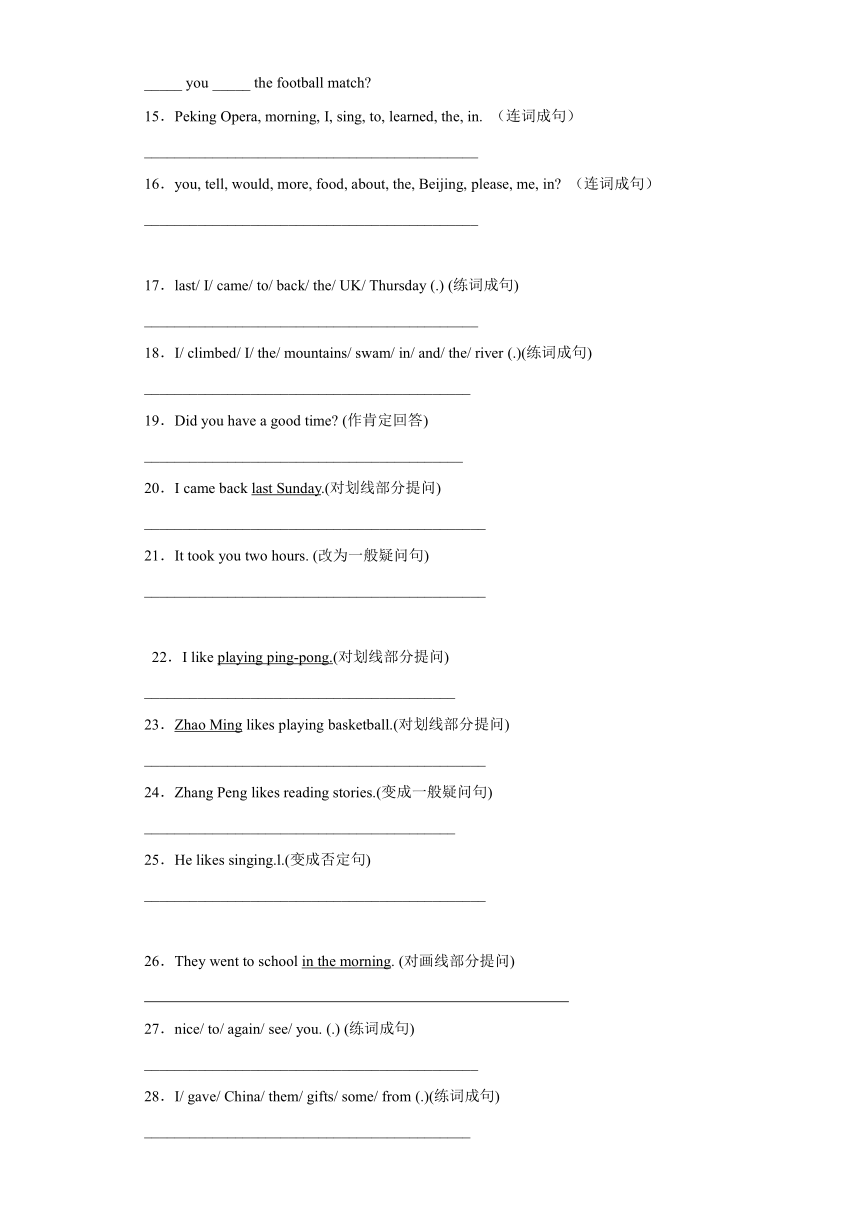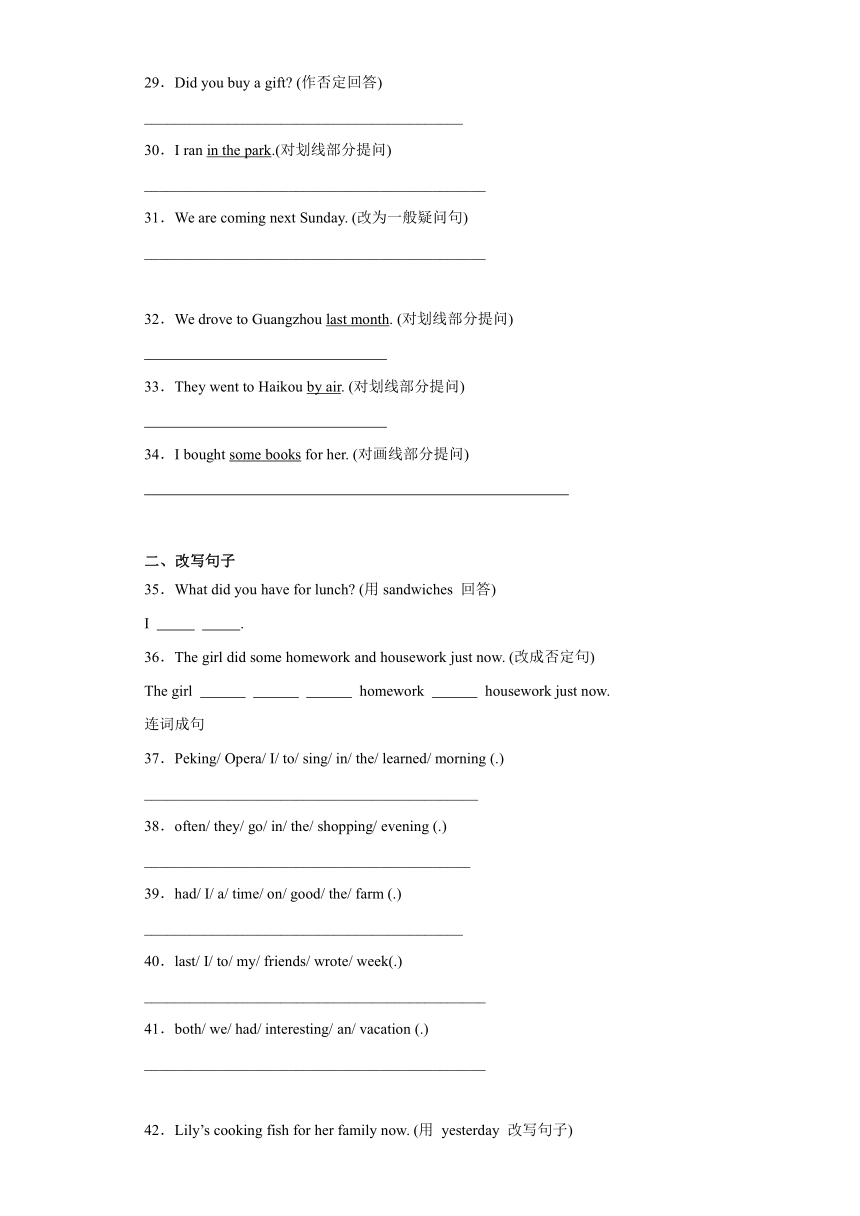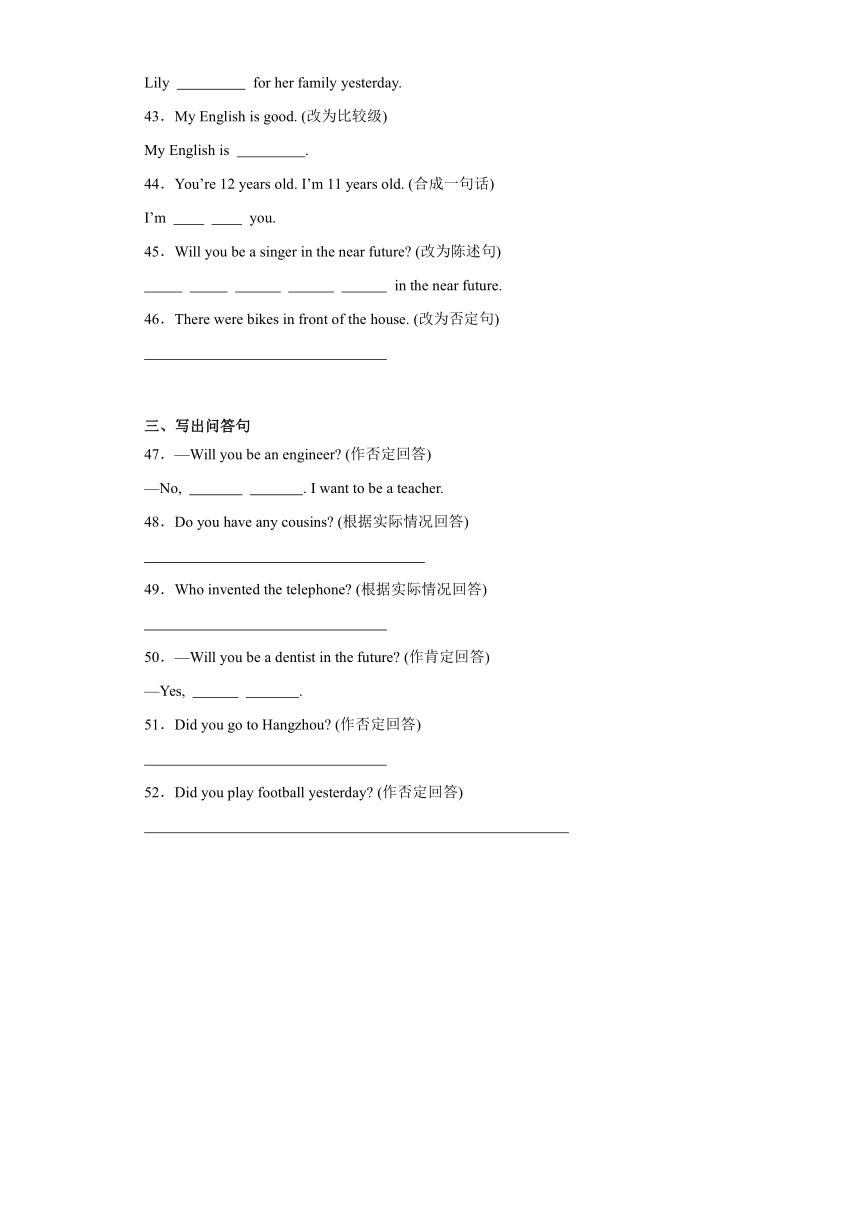北京版英语六年级上册期中英语专练:句型转换(含答案)
文档属性
| 名称 | 北京版英语六年级上册期中英语专练:句型转换(含答案) |

|
|
| 格式 | docx | ||
| 文件大小 | 27.6KB | ||
| 资源类型 | 教案 | ||
| 版本资源 | 北京版 | ||
| 科目 | 英语 | ||
| 更新时间 | 2023-10-23 16:22:10 | ||
图片预览




文档简介
期中英语专练:句型转换(试题)北京版 英语六年级上册
一、对划线部分提问
1.vacation/ Mike/ back/ to/ Canada/ went/ for/ summer (.) (练词成句)
____________________________________________
2.summer/ Yangyang/ in/ Beijing/ stayed/ for/ the (.) (练词成句)
___________________________________________
3.They went swimming yesterday. (改为否定句)
__________________________________________
4.We bought some juice yesterday. (对划线部分提问)
_____________________________________________
5.I am going to visit Beijing next Sunday. (改为一般疑问句)
_____________________________________________
6.They went to the museum. (对画线部分提问)
7.I finished the piano lessons yesterday.(就划线部分提问)
you yesterday
8.The man came back last Thursday. (改为否定句)
The man back last Thursday.
9.We won the football match. (改为一般疑问句)
you the football match
10.Peking Opera, morning, I, sing, to, learned, the, in. (连词成句)
11.you, tell, would, more, food, about, the, Beijing, please, me, in (连词成句)
12.I finished the piano lessons yesterday.(就划线部分提问)
____ ____ you _____ yesterday
13.The man came back last Thursday. (改为否定句)
The man ____ _____ back last Thursday.
14.We won the football match. (改为一般疑问句)
_____ you _____ the football match
15.Peking Opera, morning, I, sing, to, learned, the, in. (连词成句)
____________________________________________
16.you, tell, would, more, food, about, the, Beijing, please, me, in (连词成句)
____________________________________________
17.last/ I/ came/ to/ back/ the/ UK/ Thursday (.) (练词成句)
____________________________________________
18.I/ climbed/ I/ the/ mountains/ swam/ in/ and/ the/ river (.)(练词成句)
___________________________________________
19.Did you have a good time (作肯定回答)
__________________________________________
20.I came back last Sunday.(对划线部分提问)
_____________________________________________
21.It took you two hours. (改为一般疑问句)
_____________________________________________
22.I like playing ping-pong.(对划线部分提问)
_________________________________________
23.Zhao Ming likes playing basketball.(对划线部分提问)
_____________________________________________
24.Zhang Peng likes reading stories.(变成一般疑问句)
_________________________________________
25.He likes singing.l.(变成否定句)
_____________________________________________
26.They went to school in the morning. (对画线部分提问)
27.nice/ to/ again/ see/ you. (.) (练词成句)
____________________________________________
28.I/ gave/ China/ them/ gifts/ some/ from (.)(练词成句)
___________________________________________
29.Did you buy a gift (作否定回答)
__________________________________________
30.I ran in the park.(对划线部分提问)
_____________________________________________
31.We are coming next Sunday. (改为一般疑问句)
_____________________________________________
32.We drove to Guangzhou last month. (对划线部分提问)
33.They went to Haikou by air. (对划线部分提问)
34.I bought some books for her. (对画线部分提问)
二、改写句子
35.What did you have for lunch (用sandwiches 回答)
I .
36.The girl did some homework and housework just now. (改成否定句)
The girl homework housework just now.
连词成句
37.Peking/ Opera/ I/ to/ sing/ in/ the/ learned/ morning (.)
____________________________________________
38.often/ they/ go/ in/ the/ shopping/ evening (.)
___________________________________________
39.had/ I/ a/ time/ on/ good/ the/ farm (.)
__________________________________________
40.last/ I/ to/ my/ friends/ wrote/ week(.)
_____________________________________________
41.both/ we/ had/ interesting/ an/ vacation (.)
_____________________________________________
42.Lily’s cooking fish for her family now. (用 yesterday 改写句子)
Lily for her family yesterday.
43.My English is good. (改为比较级)
My English is .
44.You’re 12 years old. I’m 11 years old. (合成一句话)
I’m you.
45.Will you be a singer in the near future (改为陈述句)
in the near future.
46.There were bikes in front of the house. (改为否定句)
三、写出问答句
47.—Will you be an engineer (作否定回答)
—No, . I want to be a teacher.
48.Do you have any cousins (根据实际情况回答)
49.Who invented the telephone (根据实际情况回答)
50.—Will you be a dentist in the future (作肯定回答)
—Yes, .
51.Did you go to Hangzhou (作否定回答)
52.Did you play football yesterday (作否定回答)
参考答案:
1.Mike went back to Canada for summer vacation. 2.Yangyang stayed in Beijing for the summer. 3.They didn’t go swimming yesterday. 4.What did you do 5.Are you going to visit Beijing next Sunday
【详解】4. 划线部分是做的事情,故用what提问。
5. 句中的be动词提到句首变成一般疑问句,第一人称变成第二人称。
6.Where did they go
【详解】句意:他们去了博物馆。对画线部分提问,应该用疑问副词where引导,借助于助动词did来完成,他们去了哪里?Where did they go 故答案为Where did they go
7. What did do 8. didn't come 9. Did win 10.I learned to sing Peking Opera in the morning. 11.Would you please tell me more about the food in Beijing
【解析】7.句意:昨天我完成了钢琴课。此题考查就划线部分进行提问,句意:昨天你做什么了?用what引导的特殊疑问句,句子是一般过去时,借助于助动词,What+助动词+主语+动词原形+其他,故答案为What;did;do。
8.句意:上周四那位男士回来了。此题考查改为否定句,这是一般过去时的句子,借助于助动词didn't+动词原形,来否定,故答案为didn't;come。
9.句意:我们赢了那场足球赛。此题考查一般过去时改为一般疑问句,借助于助动词did+主语+动词原形,won是win的过去式,故答案为Did;win。
10.Peking Opera京剧,in the morning在早上,I我,sing唱歌,learned to学会,根据所给标点可知是个陈述句,根据所给词以可以连成句子:我在早上学会的唱歌。故答案为I learned to sing Peking Opera in the morning.
11.you你,tell告诉,would将要,more更多,the food食物,about关于,Beijing北京,please请,me我,in在,根据所给标点符号可知是个一般疑问句,根据所给词义可以连成句子:请你给我讲述讲述更多有关在北京的食物,好吗?故答案为Would you please tell me more about the food in Beijing
12.What did do 13.didn’t come 14.Did win 15.I learned to sing Peking Opera in the morning. 16.Would you please tell me more about the food in Beijing
【详解】略
17.I came back to the UK last Thursday. 18.I climbed the mountains and I swam in the river. 19.Yes, I did. 20.When did you come back 21.Did it take you two hours?
【详解】略
22.What do you like 23.Who likes playing basketball 24.Does Zhang Peing like reading stories 25.He doesn’t like singing.
【解析】22.此句中的画线部分是playing ping-pong,所以提问时要用What. 并将第一人称的I变为第二人称,应填What do you like
23.句中的画线部分是Zhao Ming, 所以提问时要用who. 应填Who likes playing basketball
24.此句变为一般疑问句时要借助于助动词does, 后面的动词用原形,应填Does Zhang Peing like reading stories
25.此句变为否定句时要借助于助动词does, 后面的动词用原形,应填He doesn’t like singing。
26.When did they go to school
【详解】句意:他们早上去学校。划线“在早上”,问“时间”,用when来提问。句子为一般过去时态,助动词用did,实义动词用原形go,故答案为When did they go to school
27.Nice to see you again. 28.I gave them some gifts from China. 29.No, I didn’t. 30.Where did you run 31.Are you coming next Sunday?
【详解】4. 划线部分是地点状语,故用where提问。
5. 句中的be动词提到句首变成一般疑问句,第一人称变成第二人称。
32.When did you drive to Guangzhou
【详解】原句句意:上个月我们开车去了广州。划线部分是时间,用when提问,后面跟一般疑问句,原句时态是一般过去时,助动词用did,故答案为When did you drive to Guangzhou
【点睛】
33.How did they go to Haikou
【详解】原句句意:他们乘飞机去了海口。划线部分是交通方式,用how疑问,后面跟一般疑问句,句子时态是一般过去时,助动词用did,故答案为How did they go to Haikou
【点睛】
34.What did you buy for her
【详解】句意:我给她买了一些书。画线“一些书”,问“什么”,用what来提问。句子为一般过去时态,助动词用did,实义动词用原形buy,故答案为What did you buy for her
35. had sandwiches
【详解】原句句意:你午餐吃了什么?由did可知本题为一般过去时,问句用于询问对方午餐吃了什么。回答用I had+食物。故答案为had;sandwiches。
36. didn’t do any or
【详解】本题考查句型转换。原句句意:刚才那个女孩做作业和做家务了。改为否定句,这是一般过去时的句子,变否定句借助于助动词didn’t,后加动词原形,some用于肯定句式中,any用于否定句式中,and用于肯定句式中,or用于否定句式中,故答案为didn’t;do;any;or。
37.I learned to sing Peking Opera in the morning. 38.They often go shopping in the evening. 39.I had a good time on the farm. 40.I wrote to my friends last week. 41.We both had an interesting vacation.
【详解】略
42.cooked fish
【详解】原句句意:莉莉现在正在给家人做鱼。本题考查句型转换。用 yesterday改写句子,句子时态变为一般过去时,谓语动词要用过去式,cooking的原形是cook,过去式是cooked,其他部分不变。故答案为cooked fish。
43.better
【详解】原句句意:我的英语很好。本题考查句型转换,把原句改成比较级,结构为be动词加形容词的比较级,good的比较级为better,故答案为better。
44. younger than
【详解】原句句意:你12岁了。我11岁了。合成一句话就是我比你年轻,更年轻的younger,比than,故答案为younger;than。
45. I will be a singer
【详解】原句句意为:你将来会成为一名歌手吗?本题干是一般疑问句,改为陈述句,需要将you改为I,且提前到句首,故答案为:I;will;be;a;singer。
46.There were no bikes in front of the house.
【详解】原句句意:房子前面有自行车。根据本节课所学。there be句型的肯定句变否定句,直接在系动词后面加no,故答案为There were no bikes in front of the house.
【点睛】
47. I won’t
【详解】句意:—你会成为一个工程师吗?—不,我不会。我想成为一位老师。根据No,可知,本句是否定的回答,由于will not= won’t, 故答案为:I,won’t。
48.Yes, I do./No, I don’t./No, I do not.
【详解】原句句意:你有表亲吗?该句是Do引导的一般疑问句,肯定回答Yes,主语+do.否定回答No,主语+don’t.故答案为Yes, I do./No, I don’t.
49.Mr Bell.
【详解】问句句意:谁发明了电话?根据常识可知贝尔发明了电话,故答案为Mr Bell.
【点睛】
50. I will
【详解】句意:你将来会成为一名牙医吗?是的,我会的。根据要求可知,需要作肯定回答,应该用yes,且will you的问句,可以用I will来回答,故答案为I;will。
51.No, I didn’t.
【详解】问句句意:你/你们去杭州了吗?Did开头的一般疑问句,否定回答是No, 主语+didn't. 问句主语是you,答语主语用I/we,故答案为No, I/we didn’t.
【点睛】
52.No, I didn’t./No, we didn’t.
【详解】句意:你/你们昨天踢足球了吗?由助动词did引导的一般疑问句。you可以理解为你或者你们,故答案为No, I didn’t./No, we didn’t.
一、对划线部分提问
1.vacation/ Mike/ back/ to/ Canada/ went/ for/ summer (.) (练词成句)
____________________________________________
2.summer/ Yangyang/ in/ Beijing/ stayed/ for/ the (.) (练词成句)
___________________________________________
3.They went swimming yesterday. (改为否定句)
__________________________________________
4.We bought some juice yesterday. (对划线部分提问)
_____________________________________________
5.I am going to visit Beijing next Sunday. (改为一般疑问句)
_____________________________________________
6.They went to the museum. (对画线部分提问)
7.I finished the piano lessons yesterday.(就划线部分提问)
you yesterday
8.The man came back last Thursday. (改为否定句)
The man back last Thursday.
9.We won the football match. (改为一般疑问句)
you the football match
10.Peking Opera, morning, I, sing, to, learned, the, in. (连词成句)
11.you, tell, would, more, food, about, the, Beijing, please, me, in (连词成句)
12.I finished the piano lessons yesterday.(就划线部分提问)
____ ____ you _____ yesterday
13.The man came back last Thursday. (改为否定句)
The man ____ _____ back last Thursday.
14.We won the football match. (改为一般疑问句)
_____ you _____ the football match
15.Peking Opera, morning, I, sing, to, learned, the, in. (连词成句)
____________________________________________
16.you, tell, would, more, food, about, the, Beijing, please, me, in (连词成句)
____________________________________________
17.last/ I/ came/ to/ back/ the/ UK/ Thursday (.) (练词成句)
____________________________________________
18.I/ climbed/ I/ the/ mountains/ swam/ in/ and/ the/ river (.)(练词成句)
___________________________________________
19.Did you have a good time (作肯定回答)
__________________________________________
20.I came back last Sunday.(对划线部分提问)
_____________________________________________
21.It took you two hours. (改为一般疑问句)
_____________________________________________
22.I like playing ping-pong.(对划线部分提问)
_________________________________________
23.Zhao Ming likes playing basketball.(对划线部分提问)
_____________________________________________
24.Zhang Peng likes reading stories.(变成一般疑问句)
_________________________________________
25.He likes singing.l.(变成否定句)
_____________________________________________
26.They went to school in the morning. (对画线部分提问)
27.nice/ to/ again/ see/ you. (.) (练词成句)
____________________________________________
28.I/ gave/ China/ them/ gifts/ some/ from (.)(练词成句)
___________________________________________
29.Did you buy a gift (作否定回答)
__________________________________________
30.I ran in the park.(对划线部分提问)
_____________________________________________
31.We are coming next Sunday. (改为一般疑问句)
_____________________________________________
32.We drove to Guangzhou last month. (对划线部分提问)
33.They went to Haikou by air. (对划线部分提问)
34.I bought some books for her. (对画线部分提问)
二、改写句子
35.What did you have for lunch (用sandwiches 回答)
I .
36.The girl did some homework and housework just now. (改成否定句)
The girl homework housework just now.
连词成句
37.Peking/ Opera/ I/ to/ sing/ in/ the/ learned/ morning (.)
____________________________________________
38.often/ they/ go/ in/ the/ shopping/ evening (.)
___________________________________________
39.had/ I/ a/ time/ on/ good/ the/ farm (.)
__________________________________________
40.last/ I/ to/ my/ friends/ wrote/ week(.)
_____________________________________________
41.both/ we/ had/ interesting/ an/ vacation (.)
_____________________________________________
42.Lily’s cooking fish for her family now. (用 yesterday 改写句子)
Lily for her family yesterday.
43.My English is good. (改为比较级)
My English is .
44.You’re 12 years old. I’m 11 years old. (合成一句话)
I’m you.
45.Will you be a singer in the near future (改为陈述句)
in the near future.
46.There were bikes in front of the house. (改为否定句)
三、写出问答句
47.—Will you be an engineer (作否定回答)
—No, . I want to be a teacher.
48.Do you have any cousins (根据实际情况回答)
49.Who invented the telephone (根据实际情况回答)
50.—Will you be a dentist in the future (作肯定回答)
—Yes, .
51.Did you go to Hangzhou (作否定回答)
52.Did you play football yesterday (作否定回答)
参考答案:
1.Mike went back to Canada for summer vacation. 2.Yangyang stayed in Beijing for the summer. 3.They didn’t go swimming yesterday. 4.What did you do 5.Are you going to visit Beijing next Sunday
【详解】4. 划线部分是做的事情,故用what提问。
5. 句中的be动词提到句首变成一般疑问句,第一人称变成第二人称。
6.Where did they go
【详解】句意:他们去了博物馆。对画线部分提问,应该用疑问副词where引导,借助于助动词did来完成,他们去了哪里?Where did they go 故答案为Where did they go
7. What did do 8. didn't come 9. Did win 10.I learned to sing Peking Opera in the morning. 11.Would you please tell me more about the food in Beijing
【解析】7.句意:昨天我完成了钢琴课。此题考查就划线部分进行提问,句意:昨天你做什么了?用what引导的特殊疑问句,句子是一般过去时,借助于助动词,What+助动词+主语+动词原形+其他,故答案为What;did;do。
8.句意:上周四那位男士回来了。此题考查改为否定句,这是一般过去时的句子,借助于助动词didn't+动词原形,来否定,故答案为didn't;come。
9.句意:我们赢了那场足球赛。此题考查一般过去时改为一般疑问句,借助于助动词did+主语+动词原形,won是win的过去式,故答案为Did;win。
10.Peking Opera京剧,in the morning在早上,I我,sing唱歌,learned to学会,根据所给标点可知是个陈述句,根据所给词以可以连成句子:我在早上学会的唱歌。故答案为I learned to sing Peking Opera in the morning.
11.you你,tell告诉,would将要,more更多,the food食物,about关于,Beijing北京,please请,me我,in在,根据所给标点符号可知是个一般疑问句,根据所给词义可以连成句子:请你给我讲述讲述更多有关在北京的食物,好吗?故答案为Would you please tell me more about the food in Beijing
12.What did do 13.didn’t come 14.Did win 15.I learned to sing Peking Opera in the morning. 16.Would you please tell me more about the food in Beijing
【详解】略
17.I came back to the UK last Thursday. 18.I climbed the mountains and I swam in the river. 19.Yes, I did. 20.When did you come back 21.Did it take you two hours?
【详解】略
22.What do you like 23.Who likes playing basketball 24.Does Zhang Peing like reading stories 25.He doesn’t like singing.
【解析】22.此句中的画线部分是playing ping-pong,所以提问时要用What. 并将第一人称的I变为第二人称,应填What do you like
23.句中的画线部分是Zhao Ming, 所以提问时要用who. 应填Who likes playing basketball
24.此句变为一般疑问句时要借助于助动词does, 后面的动词用原形,应填Does Zhang Peing like reading stories
25.此句变为否定句时要借助于助动词does, 后面的动词用原形,应填He doesn’t like singing。
26.When did they go to school
【详解】句意:他们早上去学校。划线“在早上”,问“时间”,用when来提问。句子为一般过去时态,助动词用did,实义动词用原形go,故答案为When did they go to school
27.Nice to see you again. 28.I gave them some gifts from China. 29.No, I didn’t. 30.Where did you run 31.Are you coming next Sunday?
【详解】4. 划线部分是地点状语,故用where提问。
5. 句中的be动词提到句首变成一般疑问句,第一人称变成第二人称。
32.When did you drive to Guangzhou
【详解】原句句意:上个月我们开车去了广州。划线部分是时间,用when提问,后面跟一般疑问句,原句时态是一般过去时,助动词用did,故答案为When did you drive to Guangzhou
【点睛】
33.How did they go to Haikou
【详解】原句句意:他们乘飞机去了海口。划线部分是交通方式,用how疑问,后面跟一般疑问句,句子时态是一般过去时,助动词用did,故答案为How did they go to Haikou
【点睛】
34.What did you buy for her
【详解】句意:我给她买了一些书。画线“一些书”,问“什么”,用what来提问。句子为一般过去时态,助动词用did,实义动词用原形buy,故答案为What did you buy for her
35. had sandwiches
【详解】原句句意:你午餐吃了什么?由did可知本题为一般过去时,问句用于询问对方午餐吃了什么。回答用I had+食物。故答案为had;sandwiches。
36. didn’t do any or
【详解】本题考查句型转换。原句句意:刚才那个女孩做作业和做家务了。改为否定句,这是一般过去时的句子,变否定句借助于助动词didn’t,后加动词原形,some用于肯定句式中,any用于否定句式中,and用于肯定句式中,or用于否定句式中,故答案为didn’t;do;any;or。
37.I learned to sing Peking Opera in the morning. 38.They often go shopping in the evening. 39.I had a good time on the farm. 40.I wrote to my friends last week. 41.We both had an interesting vacation.
【详解】略
42.cooked fish
【详解】原句句意:莉莉现在正在给家人做鱼。本题考查句型转换。用 yesterday改写句子,句子时态变为一般过去时,谓语动词要用过去式,cooking的原形是cook,过去式是cooked,其他部分不变。故答案为cooked fish。
43.better
【详解】原句句意:我的英语很好。本题考查句型转换,把原句改成比较级,结构为be动词加形容词的比较级,good的比较级为better,故答案为better。
44. younger than
【详解】原句句意:你12岁了。我11岁了。合成一句话就是我比你年轻,更年轻的younger,比than,故答案为younger;than。
45. I will be a singer
【详解】原句句意为:你将来会成为一名歌手吗?本题干是一般疑问句,改为陈述句,需要将you改为I,且提前到句首,故答案为:I;will;be;a;singer。
46.There were no bikes in front of the house.
【详解】原句句意:房子前面有自行车。根据本节课所学。there be句型的肯定句变否定句,直接在系动词后面加no,故答案为There were no bikes in front of the house.
【点睛】
47. I won’t
【详解】句意:—你会成为一个工程师吗?—不,我不会。我想成为一位老师。根据No,可知,本句是否定的回答,由于will not= won’t, 故答案为:I,won’t。
48.Yes, I do./No, I don’t./No, I do not.
【详解】原句句意:你有表亲吗?该句是Do引导的一般疑问句,肯定回答Yes,主语+do.否定回答No,主语+don’t.故答案为Yes, I do./No, I don’t.
49.Mr Bell.
【详解】问句句意:谁发明了电话?根据常识可知贝尔发明了电话,故答案为Mr Bell.
【点睛】
50. I will
【详解】句意:你将来会成为一名牙医吗?是的,我会的。根据要求可知,需要作肯定回答,应该用yes,且will you的问句,可以用I will来回答,故答案为I;will。
51.No, I didn’t.
【详解】问句句意:你/你们去杭州了吗?Did开头的一般疑问句,否定回答是No, 主语+didn't. 问句主语是you,答语主语用I/we,故答案为No, I/we didn’t.
【点睛】
52.No, I didn’t./No, we didn’t.
【详解】句意:你/你们昨天踢足球了吗?由助动词did引导的一般疑问句。you可以理解为你或者你们,故答案为No, I didn’t./No, we didn’t.
同课章节目录
